一二单元英语知识点总结
初一英语一二单元知识点总结
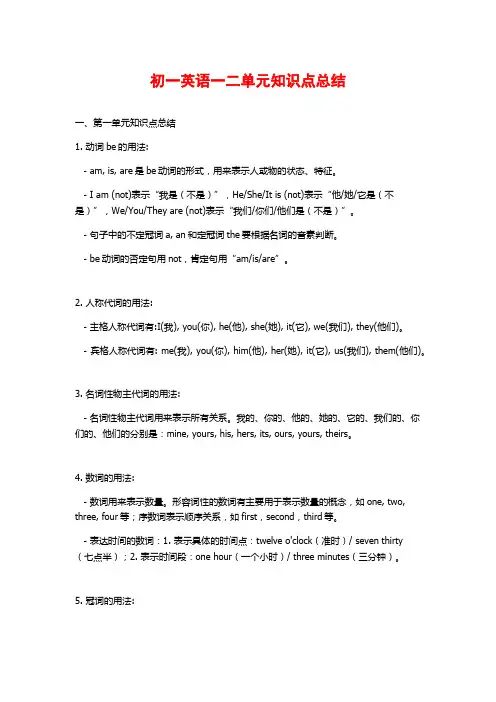
初一英语一二单元知识点总结一、第一单元知识点总结1. 动词be的用法:- am, is, are是be动词的形式,用来表示人或物的状态、特征。
- I am (not)表示“我是(不是)”,He/She/It is (not)表示“他/她/它是(不是)”,We/You/They are (not)表示“我们/你们/他们是(不是)”。
- 句子中的不定冠词a, an和定冠词the要根据名词的音素判断。
- be动词的否定句用not,肯定句用“am/is/are”。
2. 人称代词的用法:- 主格人称代词有:I(我), you(你), he(他), she(她), it(它), we(我们), they(他们)。
- 宾格人称代词有: me(我), you(你), him(他), her(她), it(它), us(我们), them(他们)。
3. 名词性物主代词的用法:- 名词性物主代词用来表示所有关系。
我的、你的、他的、她的、它的、我们的、你们的、他们的分别是:mine, yours, his, hers, its, ours, yours, theirs。
4. 数词的用法:- 数词用来表示数量。
形容词性的数词有主要用于表示数量的概念,如one, two, three, four等;序数词表示顺序关系,如first,second,third等。
- 表达时间的数词:1. 表示具体的时间点:twelve o'clock(准时)/ seven thirty(七点半);2. 表示时间段:one hour(一个小时)/ three minutes(三分钟)。
5. 冠词的用法:- 不定冠词a/an的用法:a用于以辅音音似开头的单词前,an用于以元音音似开头的单词前。
- 定冠词the的用法:指特指的人或物。
二、第二单元知识点总结1. 人称代词的宾格形式:- 单数形式:me(我)、you(你/你们)、him(他)、her(她)、it(它);- 复数形式:us(我们)、you(你们)、them(他们)。
五年级上册英语一二单元知识点总结
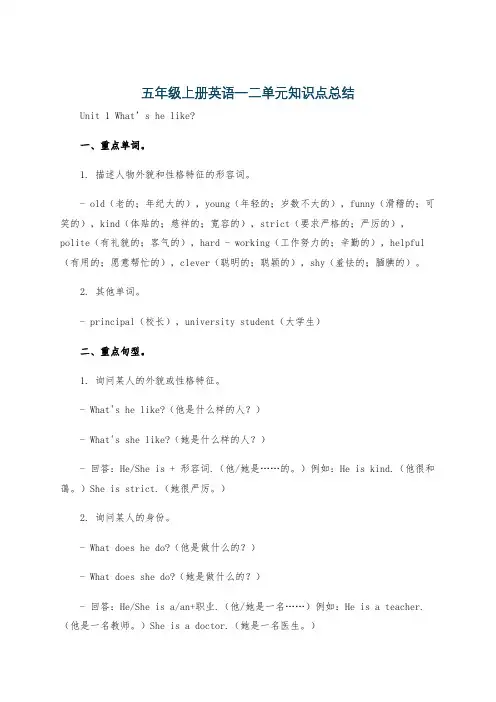
五年级上册英语一二单元知识点总结Unit 1 What’s he like?一、重点单词。
1. 描述人物外貌和性格特征的形容词。
- old(老的;年纪大的),young(年轻的;岁数不大的),funny(滑稽的;可笑的),kind(体贴的;慈祥的;宽容的),strict(要求严格的;严厉的),polite(有礼貌的;客气的),hard - working(工作努力的;辛勤的),helpful (有用的;愿意帮忙的),clever(聪明的;聪颖的),shy(羞怯的;腼腆的)。
2. 其他单词。
- principal(校长),university student(大学生)二、重点句型。
1. 询问某人的外貌或性格特征。
- What's he like?(他是什么样的人?)- What's she like?(她是什么样的人?)- 回答:He/She is + 形容词.(他/她是……的。
)例如:He is kind.(他很和蔼。
)She is strict.(她很严厉。
)2. 询问某人的身份。
- What does he do?(他是做什么的?)- What does she do?(她是做什么的?)- 回答:He/She is a/an+职业.(他/她是一名……)例如:He is a teacher.(他是一名教师。
)She is a doctor.(她是一名医生。
)3. 描述多个特征。
- He is tall and strong.(他又高又壮。
)- She is kind and funny.(她既和蔼又有趣。
)三、语法点。
1. be动词(am/is/are)的用法。
- 主语为I时,be动词用am,如:I am a student.- 主语为第三人称单数(he/she/it或单个的人名、称呼等)时,be动词用is,如:He is my father.- 主语为you/we/they或复数名词时,be动词用are,如:They are my friends.2. 形容词在句中的用法。
英语预备篇1至2单元知识点整理
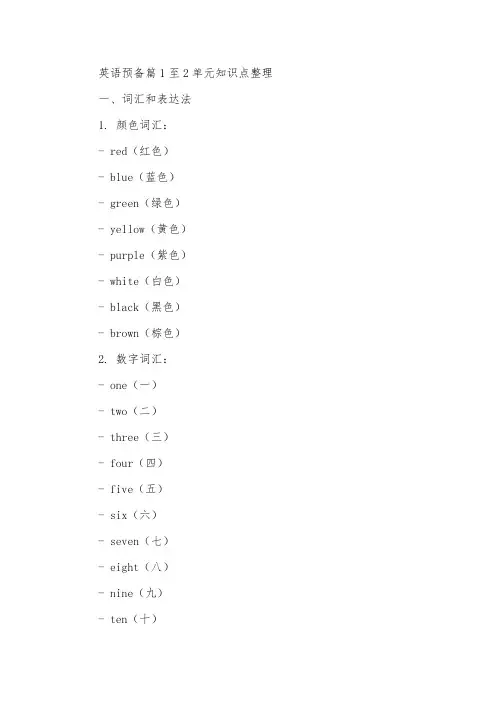
英语预备篇1至2单元知识点整理一、词汇和表达法1. 颜色词汇:- red(红色)- blue(蓝色)- green(绿色)- yellow(黄色)- purple(紫色)- white(白色)- black(黑色)- brown(棕色)2. 数字词汇:- one(一)- two(二)- three(三)- four(四)- five(五)- six(六)- seven(七)- eight(八)- nine(九)- ten(十)3. 动物词汇:- cat(猫)- dog(狗)- bird(鸟)- elephant(大象)- bear(熊)- tiger(老虎)4. 日常用品词汇:- pen(钢笔)- pencil(铅笔)- ruler(尺子)- book(书)- bag(书包)5. 问候与道别表达法:- Hello, how are you?(你好,你好吗?)- Good morning/afternoon/evening.(早上好/下午好/晚上好。
)- Nice to meet you.(很高兴认识你。
)- Bye, have a good day.(再见,祝你有个美好的一天。
)6. 感谢与道歉表达法:- Thank you./Thanks a lot.(谢谢你。
)- You’re welcome.(不客气。
)- Sorry, I’m late./I’m sorry for being late.(对不起,我迟到了。
)7. 请求与提供帮助表达法:- Can I help you?(需要我帮忙吗?)- Could you please tell me the way to the post office?(请问去邮局怎么走?)- Here, let me help you.(这里,让我来帮你。
)8. 天气表达法:- It’s sunny today.(今天晴天。
)- It’s rainy today.(今天下雨。
英语一二单元知识点
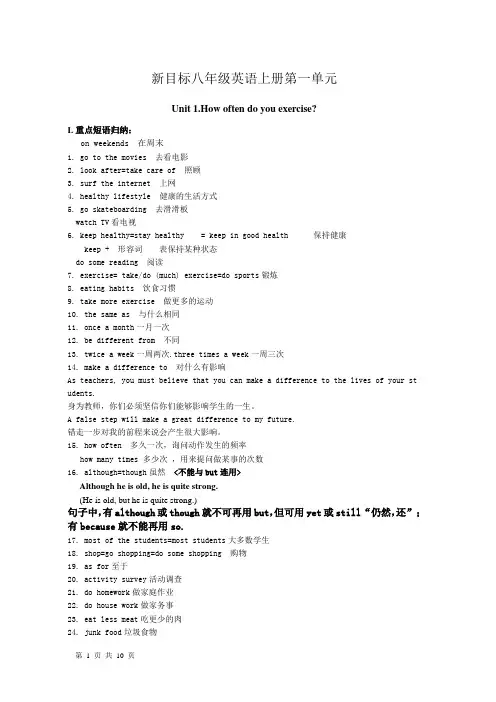
新目标八年级英语上册第一单元Unit 1.How often do you exercise?I. 重点短语归纳:on weekends 在周末1. go to the movies 去看电影2. look after=take care of 照顾3. surf the internet 上网4. healthy lifestyle 健康的生活方式5. go skateboarding 去滑滑板watch TV看电视6. keep healthy=stay healthy = keep in good health 保持健康keep + 形容词表保持某种状态do some reading 阅读7. exercise= take/do (much) exercise=do sports锻炼8. eating habits 饮食习惯9. take more exercise 做更多的运动10. the same as 与什么相同11. once a month一月一次12. be different from 不同13. twice a week一周两次.three times a week一周三次14. make a difference to 对什么有影响As teachers, you must believe that you can make a difference to the lives of your st udents.身为教师,你们必须坚信你们能够影响学生的一生。
A false step will make a great difference to my future.错走一步对我的前程来说会产生很大影响。
15. how often 多久一次,询问动作发生的频率how many times 多少次,用来提问做某事的次数16. although=though虽然 <不能与but连用>Although he is old, he is quite strong.(He is old, but he is quite strong.)句子中,有although或though就不可再用but,但可用yet或still“仍然,还”;有because就不能再用so.17. most of the students=most students大多数学生18. shop=go shopping=do some shopping 购物19. as for至于20. activity survey活动调查21. do homework做家庭作业22. do house work做家务事23. eat less meat吃更少的肉24. junk food垃圾食物25. be good for 对什么有益26. be bad for对什么有害27. want to do sth 想做某事28. want sb to do sth想某人做某事29. try to do sth 尽量做某事30. come home from school放学回家31. of course=certainly=sure当然32. get good grades取得好成绩33. some advice 一些建议some advice 中的advice 是不可数名词 a piece of advice 一则建议 give advice 提出建议take one’s advic e 采纳或听从某人的建议4. help sb to do sth帮助某人做某事=help sb with sth35. a lot of vegetables=many vegetables许多蔬菜36. hardly= almost not几乎不 hardly ever很少,几乎不,从不37. keep/be in good health保持健康38.your favorite program你最喜欢的节目39. Animal World 动物世界40. play soccer踢足球41.every day 每天every day 与 everyday1. every day 作状语,译为“每一天”。
八年级上册英语一二单元知识点
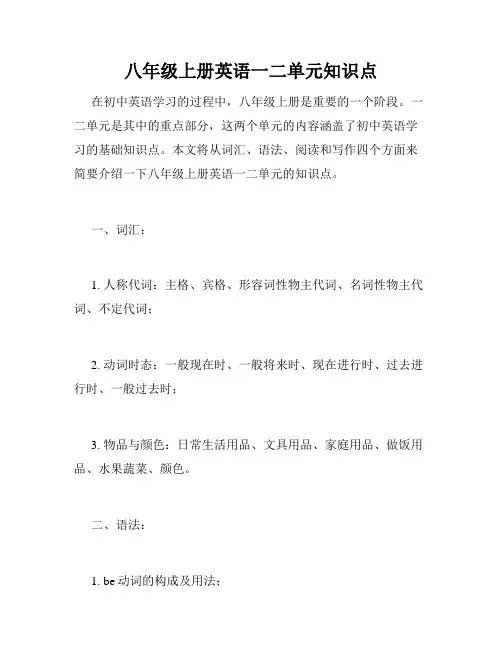
八年级上册英语一二单元知识点在初中英语学习的过程中,八年级上册是重要的一个阶段。
一二单元是其中的重点部分,这两个单元的内容涵盖了初中英语学习的基础知识点。
本文将从词汇、语法、阅读和写作四个方面来简要介绍一下八年级上册英语一二单元的知识点。
一、词汇:
1. 人称代词:主格、宾格、形容词性物主代词、名词性物主代词、不定代词;
2. 动词时态:一般现在时、一般将来时、现在进行时、过去进行时、一般过去时;
3. 物品与颜色:日常生活用品、文具用品、家庭用品、做饭用品、水果蔬菜、颜色。
二、语法:
1. be动词的构成及用法;
2. there be句型的基本用法;
3. 现在进行时及其构成;
4. 一般现在时及其构成;
5. 一般将来时及其构成;
6. 一般过去时及其构成;
7. 不定代词的基本用法。
三、阅读:
1. 根据上下文理解文章大意,并从文章中抓取关键信息;
2. 理解各类短文:包括说明文、对话及故事;
3. 阅读各种不同形式的广告和海报。
四、写作:
1. 基本英语句型,包括肯定句、否定句和疑问句等;
2. 概括整个短文内容,并恰当地使用相关词汇和句型来表述;
3. 根据所学词语和语法结构,表述自己的观点并在写作中使用
适当的句型和连接词。
总体来说,八年级上册英语一二单元的知识点比较基础,主要
是为后面的学习打下良好的基础。
理解这些知识点,对于后面的
学习和测试都有很大的帮助。
所以在学习时,应该多读多听多练,注重词汇的积累和语法的巩固。
只有坚持学习,在实践中不断锤炼,才能做到牢固掌握,取得好的成绩。
初一上册英语第一二单元知识点总结
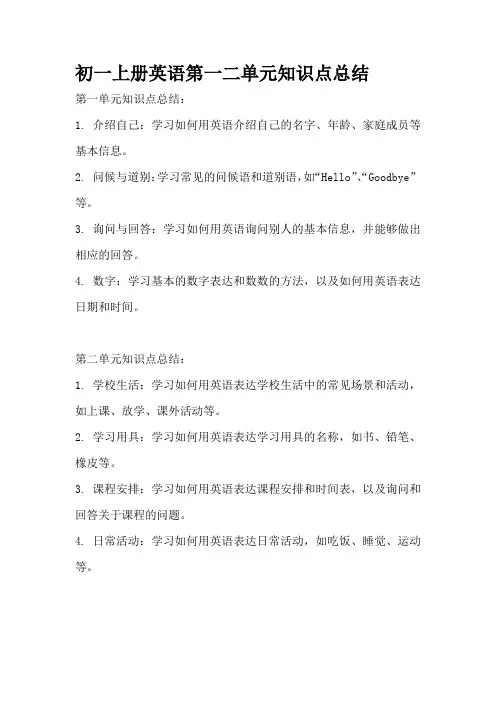
初一上册英语第一二单元知识点总结
第一单元知识点总结:
1. 介绍自己:学习如何用英语介绍自己的名字、年龄、家庭成员等基本信息。
2. 问候与道别:学习常见的问候语和道别语,如“Hello”、“Goodbye”等。
3. 询问与回答:学习如何用英语询问别人的基本信息,并能够做出相应的回答。
4. 数字:学习基本的数字表达和数数的方法,以及如何用英语表达日期和时间。
第二单元知识点总结:
1. 学校生活:学习如何用英语表达学校生活中的常见场景和活动,如上课、放学、课外活动等。
2. 学习用具:学习如何用英语表达学习用具的名称,如书、铅笔、橡皮等。
3. 课程安排:学习如何用英语表达课程安排和时间表,以及询问和回答关于课程的问题。
4. 日常活动:学习如何用英语表达日常活动,如吃饭、睡觉、运动等。
高中英语必修一、二单元知识点总结
必修一Unit 1直接引语与间接引语(Ⅰ)一.定义:1.直接引语:直接引述别人的原话2.间接引语:用自己的话转述别人的话二.直接引语变间接引语时要注意一下一个方面(1)陈述句:变间接引语时语序不变(2)一般疑问句:变间接引语时应首先在主句的谓语动词后加if/whether.再把语序变陈述语序(3)特殊疑问句:仍保持原有的疑问词,但语序变成陈述语序eg. He asked ,”Are you going home this weekend?”→He asked if/whether I was going home this weekend.“What do you want,Sara?” Mr Li asked.→Mr Li asked Sara what she wanted.3.某些成分的变化与不变(1).直接引语转化为间接引语时从句要注意5个方面的变化:①标点符号的变化“一主二宾三不变”及:直接引语中主语为第一人称则变为间接引语时人称按主语的人称变化;直接引语中主语为第二人称则变为间接引语时,人称与主句的宾语一致;若间接引语中主语为第三人称则变成间接引语时人称一般不需要变化。
④时态的变化一般现在时→一般过去时现在进行时→过去进行时现在完成时→过去完成时一般过去时→过去完成时过去完成时不变一般将来时→过去将来时⑤指示代词、时间状语、地点状语和动词的变化this→thatthese→thosenow→thenago→before/earliertoday→that dayyesterday→the day beforetomorrow→the next/following daythe day after tomorrow→in two days’ timecome→gohere→therethe day before yesterday→two days before/earliereg. He said ,”There books are mine.”→He said those books were his.(2)直接引语转化为间接引语时态五不变①直接引语为客观真理、永恒不变的事实、谚语或名人名言时eg .”The earth moves around the sun ,” the teacher told me.→The teacher told me the earth moves around the sun.Miss Guo said,”Where there is a sill,there is a way .“→Miss Guo said Where there is a sill,there is a way .②直接引语中有具体变过去的时间状语eg .Xiao Lin said ,”I was born on July 29,1992.”→Xiao Lin said she was born on July 19,1992.③习惯性动作或说话时仍然存在的情况eg .The boy said to us ,” I usually go to bed at ten every day .”→The boy told us he usually go to bed at ten every day.④当直接引语表示的客观时刻表时eg .Tom said,” The plane takes off at 6:30 a.m.”→Tom said the plane takes off at 6:30 a.m.⑤谓语中含有would,should,might,must,used to,had,hetter等eg .Tony said ,”Y ou should get up early.”→Tony said we should get uo early.Unit 2直接引语和间接引语(Ⅱ)一.直接引语为祈使句,变成间接引语时,常构成简单句型,可以按下列结构进行变化1.当祈使句表示要求和命令时,变间接引语常采用tell/command/order sb to do sth 的形式eg .”Hurry up .“He said .→He told me to hurry up.2.当祈使句表示请求时,变间接引语常采用ask/request/beg sb to do sth的形式eg .He said,”Please don’t be late.”→He asked me not to be late.二.句型变化注意事项1.直接引语中的呼语是祈使的对象,改为间接引语时常做引述动词的宾语.如原句中没有呼语,通常要加上宾语me,him,us等eg .He said,”Go and tell her,Jim.”→He asked Jim to go and tell her.2.直接引语中如果有客气的please或表示强调的助动词do,改为间接引语时必须去掉eg .He said to me,”Sit down,please.”→He asked me to sit down.Unit 3将来时1.be + v-ing 表将来时,当句子涉及确切的计划,明确的意图和为将来安排好的活动时,可用进行时表将来时。
英语必修四第一第二单元知识点汇总
Unit1 1. dress as 穿着成,扮演成穿着成,扮演成穿着成,扮演成 The girl often dressed as a boy. 2. Fight for 为…而战,争取而战,争取fight against 跟。
作战。
作战we fight for our country. We fight against the Japanese. 3. concern oneself with/about sth. 关心关心be concerned with/ in… 与…有关有关as far as I am concerned 就我而言就我而言4. devote oneself to…致力于… 花精力做某事花精力做某事5. have … in common (with ) (与…)有共同之处。
)有共同之处。
6. rather than 而不是而不是7. specialize in …专门研究,专门从事专门研究,专门从事8. a campaign against 反对。
反对。
的运动。
的运动a campaign for 支持。
支持。
的运动。
的运动9. behave oneself 行为规矩点行为规矩点10. in the shade of 在阴凉处在阴凉处11.move off 离开启程,出发离开启程,出发move away 搬走搬走move in 搬进新居搬进新居12. It’s worthwhile doing 值得做值得做be worth doing... 值得做值得做...... be worthy of being done/to be done 值得被做值得被做13 observe sb. doing sth.观察到别人正在做某事观察到别人正在做某事Observe 遵守传统,遵从规则遵守传统,遵从规则14 argue (with sb. )over/ about ….(与某人)争论…15. lead a …life 过着。
初一英语一二单元知识点总结
Unit 1 My name’s Gina一、what is , 缩略式what’s , 表示“是什么”。
问“某人的名字是什么”、“某人的姓是什么”、“某人的电话号码是什么”,都用what is 。
1、问某人的名字句型问句: What’s your name ?答句: My name’s + 名字。
/I’m + 名字。
What’s his name ? his name’s + 名字。
What’s her name ? her name’s + 名字。
2、问某人的姓句型问句: What’s your family name ?答句: My family name’s + 名字。
3、问某人的名的句型问句: What’s your first name ?答句: My first name’s + 名字。
4、问某人电话号码的句型问句: What’s your telephone number ?答句:It is + 电话号码。
What’s his telephone number ?答句:his telephone number is + 电话号码。
What’s her telephone number ?答句:his telephone number is + 电话号码。
5、Nice to meet you ! ( 见到你真高兴!) 是“陌生人”见面客套用语。
对方答语只能是Nice to meet you , too . ( 见到你也真高兴)Nice to see you ! (见到你真高兴!) 是“熟人”见面客套用语。
对方答语只能是Nice to see you , too . ( 见到你也真高兴)二、文化常识:英语人名(1)、英语人名由三部分组成:第一个名字+ 第二个名字+ 姓。
first name + middle name + family name(last name)(2)、英语人名最突出的特点是:名在前,姓在后,第二个名字不常说。
七年级上册英语1~2单元知识总结
七年级上册英语1~2单元知识总结一、Unit 1 My name's Gina.(一)重点单词。
1. name.- 名词,意为“名字;名称”。
例如:My name is Tom.(我的名字是汤姆。
)2. nice.- 形容词,意为“令人愉快的;宜人的”。
常用来形容人或事物给人的感觉。
例如:Nice to meet you.(很高兴见到你。
)3. to.- 这里是不定式符号,常用在一些固定搭配中,如“Nice to meet you.”中的“to”,无实际意义。
4. meet.- 动词,意为“遇见;相逢”。
例如:I meet my friend at the school gate.(我在学校门口遇见我的朋友。
)5. too.- 副词,意为“也;又;太”。
作“也”讲时,用于肯定句末。
例如:I'm fine, too.(我也很好。
)作“太”讲时,用来修饰形容词或副词。
例如:The box is too heavy.(这个盒子太重了。
)6. your.- 形容词性物主代词,意为“你的;你们的”,后面必须接名词。
例如:Your book is on the desk.(你的书在桌子上。
)7. his.- 形容词性物主代词,意为“他的”。
例如:His name is Jack.(他的名字是杰克。
)8. her.- 形容词性物主代词,意为“她的”。
例如:Her pen is red.(她的钢笔是红色的。
)(二)重点短语。
1. name's = name is.- 用于介绍自己的名字。
例如:My name's Gina. = My name is Gina.(我的名字是吉娜。
)2. Nice to meet you.- 初次见面时的常用问候语,回答是“Nice to meet you, too.”(很高兴见到你。
见到你也很高兴。
)3. last name.- 意为“姓”,也可以说“family name”。
- 1、下载文档前请自行甄别文档内容的完整性,平台不提供额外的编辑、内容补充、找答案等附加服务。
- 2、"仅部分预览"的文档,不可在线预览部分如存在完整性等问题,可反馈申请退款(可完整预览的文档不适用该条件!)。
- 3、如文档侵犯您的权益,请联系客服反馈,我们会尽快为您处理(人工客服工作时间:9:00-18:30)。
Unit 1 Making New Friends一、元音音素/ɑ:/ /ɔ:/ /ɜ:/ /i:/ /u://ʌ/ /ɒ/ /ə/ /ɪ/ /ʊ/ /e/ /æ//eɪ/ /aɪ/ /əʊ/ /ɪə/ /eə/ /ʊə/ /aʊ/ /ɔɪ/元音字母:Aa Ee Ii Oo Uu二、单词首字母要大写的情况1. 句首:What’s your name?2. 人名、地名:Michael Jane Henan China3. 称呼语: Mr. Wang Miss Li4. 专有名词: Class Ten, Grade Seventhe West Lake西湖the Great Wall长城5.星期: S unday周日Monday周一二、问候语1. Good morning/ afternoon/ evening. 早上/下午/晚上好!2. —Hello!/ Hi! —Hello!/ Hi!3. —Nice/ Glad to see/ meet you. —Nice/ Glad to see/ meet you, too.4. —Welcome to China/ my home. —Thanks.5. —How do you do? —How do you do?你好!6. —How are you? —Fine, thank you. And you? —I’m OK.—How is he/she? —He/She is fine/well...——他/她好吗?——他/她很好。
7. —See you then/ later. —See you. ——再见!/待会儿见! ——再见!8. —Goodbye. —Bye.9. —Thank you./Thanks./Thank you very much.—You’re welcome./ That’s OK./ Not at all.10.Let me help you. 让我帮助你吧!三、数字句型1. How old are you/ is he/ are they? —I’m/ He is/ They are eleven.2. What’s your/his/her telephone number? —It’s 4567967.3. —What class/ grade are you in?—I’m in Class Ten, Grade Seven.(注意大写)四、重要句型及短语1. —What’s your name? —My name is Sally.2. —Where are you from? —I’m from China.—Where do you come from? —I come from China.3. —Where is he/ she from? —He/She is from Japan.4. —What’s this/ that in English? —It’s a/ an…5. —What are these/ those in English? —They’re…6. —How do you spell it? —E-R-A-S-E-R, eraser.7. —Can you spell it? —Yes, M-A-P, map.重点短语:1.be from = come from2.full name全名family name姓given name名3.in Beijing; in Class7; in English; in blue; in a red shirt;in a skirt; in the same school; in different classes4.try again 再试一次5.an English book/girl/man/friend/name/ teacher6.my /her/his telephone number/ID number五、Be动词的用法1.我用am,你用are,is用于他、她、它,单数用is,复数就用are。
2.含be动词的陈述句变否定句在be后加not,变一般疑问句将be提前。
3.一般疑问句的肯定回答:Yes, 人称代词+ be;否定回答:No, 人称代词+be+ not。
如:They are teachers. They are not teachers.—Are they teachers? —Yes, they are./ No, they aren’t.六、冠词(1)不定冠词a, an的用法:(元音音素前用a,辅音因素前用an)a book/ a desk/ an apple / an orange/ an English book/ an English boy/ an old man;/ an actor/ a teacher/ a worker/ a skirt/ a bike/ an eraser (2)the是定冠词,表特指,单复数前面都可用•We are in the same class.•The girl in a pink skirt is Jane.•Where is the book?•This isn’t my bike. The blue one is mine.(3)and 的用法:1.数字相加看做单数:Two and three is five.2.颜色相加也是单数: Black and white is gray.3.人和事物相加是复数:Lucy and Lily are sisters.The pen and the eraser are Jane’s.七、名词(名词分:可数名词和不可数名词)1. 可数名词单数变复数规则(1)规则变化1)一般在名词词尾加-s,如:car---cars; photo---photos; toy---toys; boy---boys2)以s, x, ch, sh结尾的词,在词尾加---es,如:box---boxes; bus---buses 3)以辅音字母+y结尾,变y为i再加es,如:baby---babies; family---families4)以fe结尾,变fe为v再加es,如:knife--- knives(2)不规则变化:如:foot---feet; man---men; woman---women; snowman---snowmen;2. 集体名词:people, clothes, police, family3. 成双出现的名词:shoes, pants(trousers), gloves, eyes, ears一词多义:An orange is orange.桔子是橘色的。
2.不可数名词(没有数的变化)如:hair,milk牛奶,water水Unit 2 Looking Different一、重点句型1.Who is your favorite actor? My favorite actor is...2.We are in the same school, but we are in different grades.3.What do/does +主语+look like? ……长得怎么样?—What does he look like? —He is not very tall but very strong.—She is tall and has short brown hair.4.We don’t look the same, but we are good friends.We look the same, but we are in different clothes.5.What color is/are +主语?---It’s/ They’re +颜色.What color is her hair? --- It’s blond.6.This is my cap. = This cap is mine.Is this your cap? = Is this cap yours?Whose cap is this? = Whose is this cap? --- It’s Sally’s.—Whose are these bananas? —They’re their bananas/ theirs.7.His pants are blue and mine are white.(mine=my pants)My T-shirt is green and his is brown.(his=his T-shirt)8.I have small eyes, but he has big ones.(ones指代eyes)My jacket is blue and white. That one is blue. (one指代jacket)后者与前面提到的事物是同类,而非同一事物(同类不同物)二、重点短语1.give sb. sth. = give sth. to sb. 把某物给某人The girl will give the letter to Maria.=The girl will give Maria the letter. Please give it to her.2.Look! 看!(单独使用)Look at+宾语. 看......! Look at the photo! look the same 长相相同look different 长相不同,看起来不一样look like+宾语看起来像...... look different from+宾语看起来与......不同see看见,看到I see. 我明白了!3.look like看起来像He looks like his father. = He and his father look the same.4.next to 在……旁边The boy next to me is my good friend.5.in +颜色穿着……颜色的衣服in +a/an +颜色+衣服穿着……颜色的……The boy in a yellow T-shirt and gray pants is my good friend.6.数字+(形状、大小)+颜色+n. two big red apples7.want to do sth. 想要做某事want sb. to do sth. 想要某人做某事I want to buy a T-shirt. 我想买一件T恤衫。
